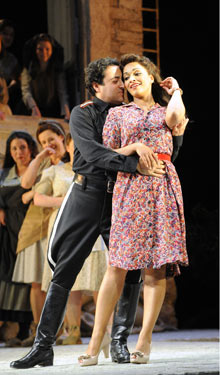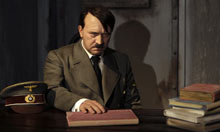Hello from Stephen Moss and welcome to what may be the world's first live blog of an opera. I'm not quite sure how I got this gig – I do like and admire Wagner and did once see a fantastic semi-staged performance of this opera conducted by Bernard Haitink at the Royal Albert Hall, but I'm no expert. Maybe I've been chosen for that very reason – we're on this journey (sorry, I hate that phrase too) together.
We're all part of a global experiment in operatic outreach with this afternoon's performance of Wagner's Die Meistersinger von Nürnberg from Glyndebourne in sunny Sussex being beamed (that probably isn't the right technical word but you will quickly discover you are in the hands of a technological imbecile) to viewers (users?) of this website, people in cinemas across the UK and in Germany, and a special event at the Science Museum where the opera is being shown on what the Science Museum says is "one of the the biggest screens in the UK, accompanied by 12,000 watts of digital surround sound". Sounds great, but it's too late for you to get there, so you're stuck with us for the next six hours.
Here's a list of the cinemas where the production is being shown, though I'm hoping you won't leave me and go to your nearest big screen instead.
Sadly, I am not at Glyndebourne, surrounded by hills and rolling sheep, by women in flowing dresses and men in dodgy bowties quaffing champagne and eating salmon sandwiches. I am at the Guardian's offices near Kings Cross in a pair of shorts and with a couple of dog-eared cheese and pickle sandwiches to see me through this operatic marathon. These are difficult days in the media biz.
This is the first – and almost certainly the last – time I've liveblogged anything, and I'm sure to run out of things to say quite quickly, so please add interesting comments below the line here. We're also hoping the odd person might tweet from Glyndebourne or the Science Museum or one of the participating cinemas. Maybe one of the underemployed musicians in the pit at Glyndebourne – the second harp, someone like that – will tweet as we go along. I'm also hopeful that someone who'd gone to the multiplex to see Bad Teacher might have found themselves in Meistersinger (as we aficionados call this opera) by mistake, and will tweet their bafflement after four hours or so. If you do tweet, please use the hashtag #diemeistertweeter.
Silence in the audience. We're about to begin folks. Here's a link to the stream.
An early note from Guardian critic and Radio 3 stalwart Tom Service, who is in St Petersburg covering the Tchaikovsky piano competition but watching this with us: "Interesting tempo Vladimir chose on first night - will he be as fast tonight?"
Hello Tom and thanks for taking part in what I fear we may have to call a UNIQUE GLOBAL EXPERIMENT IN OPERA FOR ALL.
My live-blogging colleagues tell me it's essential these things aren't all text, so here's a picture of Wagner, the composer of this mighty work.

Oops, wrong Wagner. Here's the real one, looking a bit like a Teutonic John Wayne.

I'm wrestling with about seven different screens here and finding it very hard to concentrate on the music, so I'm relying on you lot for proper musical appreciation. Tempo in the overture seems quite stately to me. When we talked last week, Jurowski surprised me when he said the piece would take five hours, I had it down at about four and a half. Terrific sound quality. You can hear every violin. Brilliant moment when the orchestra gives way to the chorus. What Wagner expert Michael Tanner calls "one of the many musical coups de theatre in Meistersinger".
Because I've already slightly lost track of where we are Meistersinger-wise, I want to play for time by adding a link to a piece Norman Lebrecht wrote today about how opera is the new rock and Glyndebourne the new Glastonbury. Something like that anyway. All I want to say about the opera at this stage is that overacting adolescents (ie the apprentices) on stage always annoy me.
Greetings to @Gambiano, who is watching from the Gambia and has commented below. Please let us know where else you are watching this from. Glyndebourne is running an "extreme picnicking" competition, and @Gambiano must have a chance of winning if he/she sends in a pic.
Derek, who is looking after the live stream here, has just gone for a cigarette break, so hang on to your hats. Anything could happen. If there's a break in transmission, talk among yourselves.
For the sake of transparency etc etc, I should point out that this afternoon's performance is not quite live. I think it's been billed as a live stream in some places, but they actually started half an hour before us at Glyndebourne and we'll be catching up as the afternoon progresses. They have two intervals, one of which is very long to allow for supper and picnics and that sort of thing, and the cinemas thought that eating hotdogs for an hour and a quarter would be inadvisable. Anyway, I'm told we'll be catching up as the afternoon goes on, and if we really put our skates on maybe we can finish ahead of Glyndebourne.
If all goes according to plan, the first act will end just after 16.30. There'll then be a 30-minute interval, followed by the second act, which will run from 17.05 to 18.10; then a 50-minute interval; followed by the monster third act running from 19.05 to 21.15. Almost five hours of music for what is essentially a simple story of boy meets girl, boy briefly loses girl, boy wins girl by singing better than his rivals. That, at least, is my understanding of the plot, which I hope will emerge in more detail during the next six-plus hours.
My colleague Imogen Tilden, the Guardian's classical music editor, has put together a fantastically helpful package of material that will tell you everything you want to know about this work. In fact, possibly more than you want to know. There are links elsewhere on this page, but I'll repeat them here:
There's a synopsis of the opera, important because it saves me having to do one. A libretto, just in case your German is a little rusty. The key motifs you hear throughout the work. The use of motifs was one of the ways in which Wagner revolutionised opera in the 19th century, moving it on from linear storytelling to something more organic (I'm approximating and hoping for the best here, as you can probably tell). The Ring, which has more than 100 motifs, is the apotheosis of his motivic method. Meistersinger is more traditional in form than The Ring, but the motifs still play an important part, so the guide will be handy. May also be useful if you want a Wagnerian ringtone.
There's a complete score for real nerds. I love people who sit at concerts reading the score. What are they trying to do? Spot conductors' errors? And what would they do if they did spot one? Shout out "Oi, that was supposed to be an E flat." Or is it really just an attempt to impress the rest of us? And here's a gloss on the opera from Sir Denis Forman's brilliant book, The Good Opera Guide, which manages to be both very funny and immensely informative. Apparently, it's currently out of print and some enterprising publisher should bring it back into print as quickly as possible.
@guydammann has raised an interesting question in the discussion below:
Talking of paying attention, does anyone know if the singers are briefed to act in a slightly different manner when expecting close-up camera work? I think the increasing presence of cameras in opera theatres is certainly changing the way operas are directed in general, but wonder if it changes for the specific performances/recordings
Thoughts? I assume we haven't reached that stage quite yet, though it's sure to come.
Guy also admits to doing the washing up to Solti's Ring cycle. Bang goes his gig as TLS music critic.
One other thing: Derek is back and says his name, bizarrely, is spelt Derrick. He'd like it corrected for when his mother sees it, but the real question is what was she doing naming him after an oil rig in the first place?
Lots of people are tweeting under the hashtag #diemeistertweeter. Here are a selection:
@RuthElleson Wow, the ceiling's fabulous - couldn't see that from the Upper Circle!
@keithb_b Wondering how loud I can turn up #diemeistertweeter before the neighbors complain...
@ChrisMBirch Caught the prelude of @glyndebourne's Die Meitsersinger online V. rousing! Might have to [stay] bed in for the day to see it all
@NicholasWroe Watching intro on a phone! sound & vision ridiculously good #diemeistertweeter [bravo! new flashy HTC Sensation]
@Danielledeniese @glyndebourne at science museum in London for live broadcast of #Meistersinger very exciting, check it out online- guardian site live stream
 Photo by Alastair Muir / Rex Features
Photo by Alastair Muir / Rex Features
Great to have Guardian writer Nick Wroe (a closet Wagnerian) on board, and wonderful that the soprano Danielle de Niese is flying the flag too. Here's Ms De Niese in L'Elisir D'Amore at Glyndebourne.
So we have reached the end of the first act. Let's collect our thoughts and have a liedown. I'm exhausted. Worse, I have already eaten my cheese and pickle sandwiches. Let's hope there something edible in the Guardian canteen.
OK, I managed a cup of tea. Hope you are also refreshed. I really enjoyed the countdown clock, and the woodwind practising snatches from The Sound of Music in the auditorium. Our colloquy of critics below the line seem pretty happy with both the production and this transmission, which seems to be working everywhere except Norfolk, where Fiona Maddocks has more or less given up. Apologies, Fiona. This being Wagner, we have, of course, barely begun. The next act is going to get really confusing.
Look I don't want to boast but this relay is being watched by REALLY FAMOUS PEOPLE. The music critic Alex Ross has just tweeted:
@alexrossmusic Back in Rome, arriving late to @guardian's live stream of Meistersinger
People are listening all round the world. @antontsai is watching it from San Francisco. @dhirose in Japan tweets this:
グラインドボーンの《マイスタージンガー》、観始めてしまった。でも明日は早起き日なので、第1幕だけでやめる。やめるつもり。やめられるといいなあ…。
Which we think translates as "It's terrific but it's really late here and I have to go to bed." Oh come on @dhirose, live a little!
Meanwhile, @mariinskyen is in St Petersburg and has tweeted to say he/she is really enjoying it. молодец! @mariinskyen
Thankfully, no one had yet said it's a load of cobblers.
BTW, Derrick has now left the building. His mother is apparently furious about me making fun of his name. Steve has taken over technical matters. He must be very confident that things are going well, because he's reading Crime and Punishment.
I'm spending quite a lot of time on Twitter, so do let me know if anything dramatic happens on stage. A fire, for instance. This is probably not the time to mention conductor Adrian Boult's dictum that two acts of Wagner in an evening is enough for anyone, thank you. I saw The Ring at Bayreuth once, and noticed people did it in teams, skipping the odd act. Not a bad tactic.
This is an entirely non-technical comment, but I have to say Walther certainly looks every inch the knight. I do hope he wins the Eurovision song contest we will be witnessing in a day or so.
OK, moan time. Are some of these shots not a bit murky? What happened to the lighting cameraman?
And @OperaAnywhere is not enjoying it in Oxford, moaning that sound quality at the cinema is poor and the audience is noisy. C'mon guys, easy with the popcorn.
Would like to hear from folks in cinemas, using the hashtag #diemeistertweeter.
As my technical colleague here Madhvi points out, people in cinemas will not be reading this, but frankly I don't care.
Not sure what to make of this tweet from Jeff Jarvis:

@jeffjarvis Guardian takes live-blogging to an amusing extreme: chronicling Die Meistersinger. Next: live-blogging sunrise?
Sunrise, not a bad idea. We could segue from the end of Meistersinger at Glyndebourne directly into the Sussex sunrise.
A controversial view just posted below by @fastandbulbous
Great vision and sound and far preferable to the hassle/expense/snobbery of an actual visit to the opera, so many thanks, hope it catches on
.
First, I don't think this is supposed to be a substitute for but an addition to the live experience. Second, is opera really posh? We will discuss this in the interval, which is imminent.
Good riot, BTW. Time for dinner. Do not abandon us!
That last note was a bit of a shock through the headphones. Almost fell off the chair.
Am I alone in really liking Beckmesser's serenade? asks @MartinKettle. You are not, Martin. It is lovely. Seems Wagner couldn't write unbeautifully even when he tried. And thanks for being with us today, and bringing your expertise to this. Thanks, indeed, to all the critics, and great that Fiona Maddocks is still with us, having climbed a stepladder on a beach in Norfolk to keep watching. Just a little worried what will happen to her when it gets dark and the tide comes in. Guardian/Observer critics suffer for their art.
Oh dear, a hint of controversy. @KateMolleson has just made an incendiary suggestion:
Wait a minute.... this interval background noise is exactly the same as it was during first interval. Same lady talking about her plans for next Friday and Sunday, same clarinet practising Peter & the Wolf. Weird they've prerecorded it. Makes you wonder what's actually going on right now that they're hiding from us.
So the suggestion is that what we are hearing now are not real auditorium sounds, but stock auditorium footage (can you have audio footage?). We've got one of our top investigative journalists (OK, it's actually Max Walker) on to this. He's phoning Glyndebourne right now, and we'll be back to you. Ha! This'll show Jeff Jarvis. Sunrise, indeed.
BREAKING NEWS: Our top investigators have cracked the auditorium noise story. It is on a loop from a previous production of something or other (almost certainly by Donizetti). A Glyndebourne spokeswoman says that if you had the microphone on now, all you would hear would be silence or the distant sound of mating mallards, which would make people think their computer had broken down. She assures us that the stream of the opera is indeed real, and not taken from a La Scala production of 1947. Who says these live blogs can't demonstrate old-fashioned journalistic virtues? This is a genuine SCOOP.
So, is opera posh? And is Glyndebourne especially posh? There's already been a bit of discussion of this down below. My view, for what it's worth, is that opera certainly isn't inherently posh: it's a visceral artform full of love, death, blood, lust, all the eternal verities. Somehow in this country it's come to be seen as an upper class, high culture thing, and we have to beat that down at every opportunity.
As for Glyndebourne, clearly, some of the ticket prices are very steep – £250 for the stalls! But you can stand for £20 (it's a long time to stand but I once stood at the Met in New York for Richard Strauss's extremely long-drawn-out Rosenkavalier and it is possible), and there are seats for £60. Also, Glyndebourne tours its productions to less glamorous theatres with much lower prices, so as today's event shows they are conscious of the need to show they're not some sort of exclusive, plutocratic enterprise. And ignore the black tie etiquette – it's not obligatory, it's just a bit of fun, part of the escape from the workaday world.
Sorry, that's rather perfunctory. I really believe in opera for everyone, and I hope today's experiment is part of that evangelising. Pub opera, street opera, cheap tickets at established opera houses, friends' schemes, outreach – there's masses of stuff happening. New operas, as that piece by Norman Lebrecht quoted earlier showed, are exploring 21st-century themes and showing opera didn't stop with Britten and Shostakovich. We are at a great moment in opera. End of sermon.
Act 3 has started! Back to the stream opera lovers! This is, as Wagner always used to say, a marathon, not a sprint.
Critic Paul Guest is at today's performance and has just emailed us his thoughts:
Finley is actually much better than I first thought. Worried through Act I that he wasn't pacing so well, but Act II has shown off his greatest talents – dramatically wonderful with facial expressions showing off Sachs' humanist realism. The London Philharmonic under Jurowski are like a flock of birds taking flight into the auditorium in glorious succession. Glyndebourne's best is on show this evening. The production dips into blander moments, but overall it seems supreme.
 Photograph: Tobias Schwarz/Reuters
Photograph: Tobias Schwarz/Reuters
OK, I've just dipped below the line and noticed mentions of Hitler, anti-semitism and Schopenhauer. It's time to get rigorous and ask what this simple love story is really about, and why it was the in-house favourite of the Third Reich. Who wants to start? And who wants to explain the centrality of the concept of Wahn in the opera?
The problem for us Wagnerians was that Wagner was certainly an anti-Semite. Some argue that Beckmesser was modelled on Jewish critic Eduard Hanslick, and though this is disputed the general charge of anti-semitism holds. But Wagner's views need to be seen in a 19th-century context. He was not some kind of proto-Nazi, as the people who link him with Hitler would have us believe. Hitler, being a dysfunctional loner, loved his work, and you can view his death in a Berlin bunker in 1945 as a dramatically powerful but extremely expensive staging of Götterdämmerung, the concluding part of Wagner's Ring Cycle. But the fact that Hitler was a Wagnerian doesn't make Wagner a Hitlerian. Wagner was a political radical in his youth – though had become a more conservative figure by the time he completed Meistersinger in the late 1860s – and plenty of directors have found socialistic and even green themes in his work. Like all great artists, he evades easy pigeonholing; he contains multitudes.
I talked to Vladimir Jurowski, Glyndebourne's music director and the conductor of this afternoon's performance, about the issue a couple of days ago and you can catch the interview here, complete with some musical examples from Jurowski's favourite recording – by Herbert von Karajan and the Dresden Staatskapelle on EMI.
He and director David McVicar have tried to humanise this Meistersinger, concentrating on the human drama rather than the political message (which becomes clear at the end of the opera) that Germany must protect its cultural traditions and that artists must shape the nation's destiny. It was that latter message which attracted Hitler, wannabe artist and didbe dictator. How he must have identified with Sachs, renouncing the seductive frenzy of love (Wahn) for the greater truth of art.
This may, or may not, be cobblers.
This is certainly not cobblers from the brilliant @guydammann, who actually understands Wahn.
Wahn, Stephen, since you ask, literally means "madness" or "delusion". But it's also a reference to the Schopenhauerian idea that there is nothing "real" about the world as we perceive it - what we perceive are subjective illusions or representations. The aria is about how we are everywhere at the mercy of this "folly" (i.e. the riot last night), but that we have to accept our human limitations and use illusion/delusion to our advantage through noble institutions, like subsidised opera...
Wagner's house is called Wahnfried (free from wahn).
It's partly the spontaneous side of "wahn" that Sachs senses is so powerful in the character of Walther and his free song. He's looking for a form of art that really does elevate its audience, by making them aware of their own freedom as individuals, rather than reinforcing their cosy prejudices etc.
Needless to say, Hitler didn't quite see it like that
Unfortunately for the brilliant @guydammann, having wrecked his relationship with the TLS earlier by being unduly populist, he has now done the same with the Guardian by mocking our concept of a continuous commentary in real time on one of the canonical works in world opera.
You can also think of "wahn" in terms of the need to write comments on a live blog designed to accompany one of the most engrossing pieces of music-theatre ever conceived...
On the subject of interpretation, I once sat behind Bernard Levin at Covent Garden during Götterdämmerung, and at the end an American woman came up to him and said "Oh Mr Levin, did you notice Siegfried and Hagen were both wearing green suits – do you think that was significant?" Clearly, she felt she had found the key which would unlock the notoriously labyrinthine Ring. Levin pondered for a long time, then made what I thought was a majestic reply. "No-ooo, it was probably just some material left over from Don Giovanni."
That sounded like real laughter in an opera house – a rarity.
The tweets are pouring in. Keep 'em coming. Here are a selection:
@KathyLette Meistersinger is a medieval X Factor. If u imagine sim cowell+ louis in lederhosen + the winner marrying danniI minogue - u get the plot .
@JessicaMuirhead Wow, a dream 83 years in the making?! Totally worth the wait! Production is gorgeous, & great performances!
@nahokomusic I'm enjoying this Feisty Eva!
@glyndebourne It's official - we're #betterthanbono Now at No.9 in the most viewed on the Guardian website, one place above U2.
@jfderry Ha! Glasto coverage needs to take a break but Wagner's still going. True grit.
Just for the record, as it were, we now have chapter and verse on when the interval chatter was recorded: during the interval of L'Elisir d'Amore on 9 June. A pleasingly nerdish footnote to proceedings.

Guardian critic @andrewclements has joined us for the final act, and likes what he has seen so far
First impressions: David McVicar's wonderful attention to the tiniest detail comes over wonderfully through the cameras, even on the minuscule netbook screen I'm using, and as one of those who wondered whether Sachs was really the right role for Gerald Finley, I'm happy to be confounded.
Since Andrew has raised the crits, let's sample a few:
Fiona Maddocks, in the Observer, loved the playing:
Musically, it was judged faultlessly for the scale of the theatre by Vladimir Jurowski, who conjured playing of mercurial clarity – not the first words one would normally choose for this gargantuan score – from the London Philharmonic Orchestra, sustained with unfailing vigilance and concentration. Can someone award them bonus pay?
But she had doubts about the production:
A compelling rationale is needed to explain why McVicar uprooted a work so steeped in the Renaissance and plonked it down in, of all things, the Biedermeier-Regency period, with Eva and Magdalene tripping along, in gauzy empire-line gowns, as if they were the Bennet sisters in search of Darcy.
Tim Ashley, in the Guardian, like pretty well all the critics, hymned Gerald Finley's Sachs:
Finley, silencing concerns that the role would defeat him, is extraordinary both vocally and dramatically. There are no problems here with slips in intonation or a lack of lustre in his tone that marred some of his work last year. Few interpreters, meanwhile, have registered quite so vividly Sachs's intense feelings for his late wife, or the emotional pain involved in his realisation that a relationship with Anna Gabler's Eva could only result in disaster for them both.
Rupert Christiansen, in the Daily Telegraph, felt the production was less winning than Richard Jones with Welsh National Opera last year:
Jones communicated with more arresting originality and imagination what this opera is profoundly about – the nature of art, and the place that the artist has in society.
But Richard Morrison, in the Times, loved McVicar's straightforwardness:
The most jolting thing that you can do with Wagner these days is to stage his operas in a way that the composer might recognise. That's exactly what McVicar gives Glyndebourne's pounds 250-a-ticket punters in the opening production of the season. And he does it with huge panache, even if the bustling fairground frolics he concocts for the song contest make this great final scene look like Mary Poppins relocated to 19th-century Nuremberg.
The Mary Poppins bit is just coming up, so get ready to be wowed (or horrified).
That stage looks extremely crowded. Thrilling stuff, though. By now the Meistersingers motif has been drilled into our brains and we're being swept along. It also helps that we're well past Tower Bridge for the second time and can almost see Birdcage Walk. I'm keen to go to the loo, but feel I have to mimic auditorial conditions.
Great news: this entire transmission will be on the Guardian site for the next week, and can be accessed at guardian.co.uk/glyndebourne. It should go live at about midday tomorrow.
And even more good news: Benjamin Britten's The Turn of the Screw will be streamed on guardian.co.uk on Sunday 21 August.
Thumbs up from Andrew Clements for Jurowski's tempi:
On this evidence I don't understand the criticism which someone made of the first night that Vlad's conducting was very slow - unless he's speeded up during the run. He's certainly not racing through it, but it doesn't sound inordinately slow to me and the orchestral detail is wonderful.
And now the Slovakian entry ...
Or do I mean the Franconian entry? Either way, ladies and gentlemen, I think we have a winner. Though Sachs may ambiguously, and troublingly, take the laurels at the end. Without his nationalist coda, how much easier this opera would be.
A short party political broadcast on behalf of the Volk ...
Thanks Hans. Another time. Let's just celebrate young love for now. Notice Beckmesser is treated sympathetically here. Sometimes he's driven from the stage.
Audience not quite sure whether to start applauding with the on-stage party in full swing, but now they can go a bit crazy.
A huge ovation for Finley. Richly deserved. He'll be singing this part for the next 20 years if he wants to.
@Clarence Just wait till midday tomorrow. The whole thing will be online on guardian.co.uk/glyndebourne. Enjoy it there. I certainly plan to watch it again.
Critic Paul Guest has sent his concluding thoughts from inside the hall:
Let me catch my breath, wow! A greatly paced Meistersinger from the whole cast. I applauded the chorus in their enchantingly brilliant performance. Finley becomes the perfect Hans Sachs and provides a Sachs of humanist realism. Jurowski conducts at a rather wonderful tempi and doesn't let the music sag, with waves of Wagnerian colour and glory coming from the pit. I also admire McVicar's classic approach and his attention to detail; he made sure every character – from chorus member to the principals – had their own emotion to the situation. The best opera I've seen all season.
Finally, thanks so much to Glyndebourne and to sponsors Audi for making this event possible. Remember that the entire transmission will be on the Guardian site (guardian.co.uk/glyndebourne) for the next week, and this blog will also be available for you to add learned (or indeed ribald) comments over the next few days. Further discussion of Wahn and that curious Sachs commentary at the end of the opera welcome. Also look out for the streaming of The Turn of the Screw on 21 August, and let's hope this is the beginning of a long association between Glyndebourne and the Guardian. What a fantastic way to see and discuss, dissect and argue over opera. Thanks to everyone who watched and took part. And apologies to Derrick and his mother.
We'll end with some concluding tweets:
glyndebourne
140 singers, dancers, jugglers and firebreathers on stage. (Before you comment - that's stage beer by the way)
@hans_g
Guardian livebloggar en Wagner-opera. Man måste bara älska sådant.
"Guardian live blogs a Wagnerian opera. You just have to love that."
@shochi_hh I love Beckmesser
[Well done @shochi_hh. We admire the counterintuitive.]
@mngreenall
wow... don't you think you could have fitted a few more people on the stage though?
ヴァルターの歌を聴くために戻ってきた。…ご本人はまあともかく、英国の演出はとにかく合唱団一人一人の演技が本当に上手い。そのまま映画を見ているみたい。全員が見事な
"Everyone was stunning."
[Is Japanese really that prolix, or have we lost something in translation?]
• This article was amended on 27 June 2011. The original contained this sentence: "The problem for us Wagnerians was that Hitler was certainly an anti-Semite." This has been clarified.




